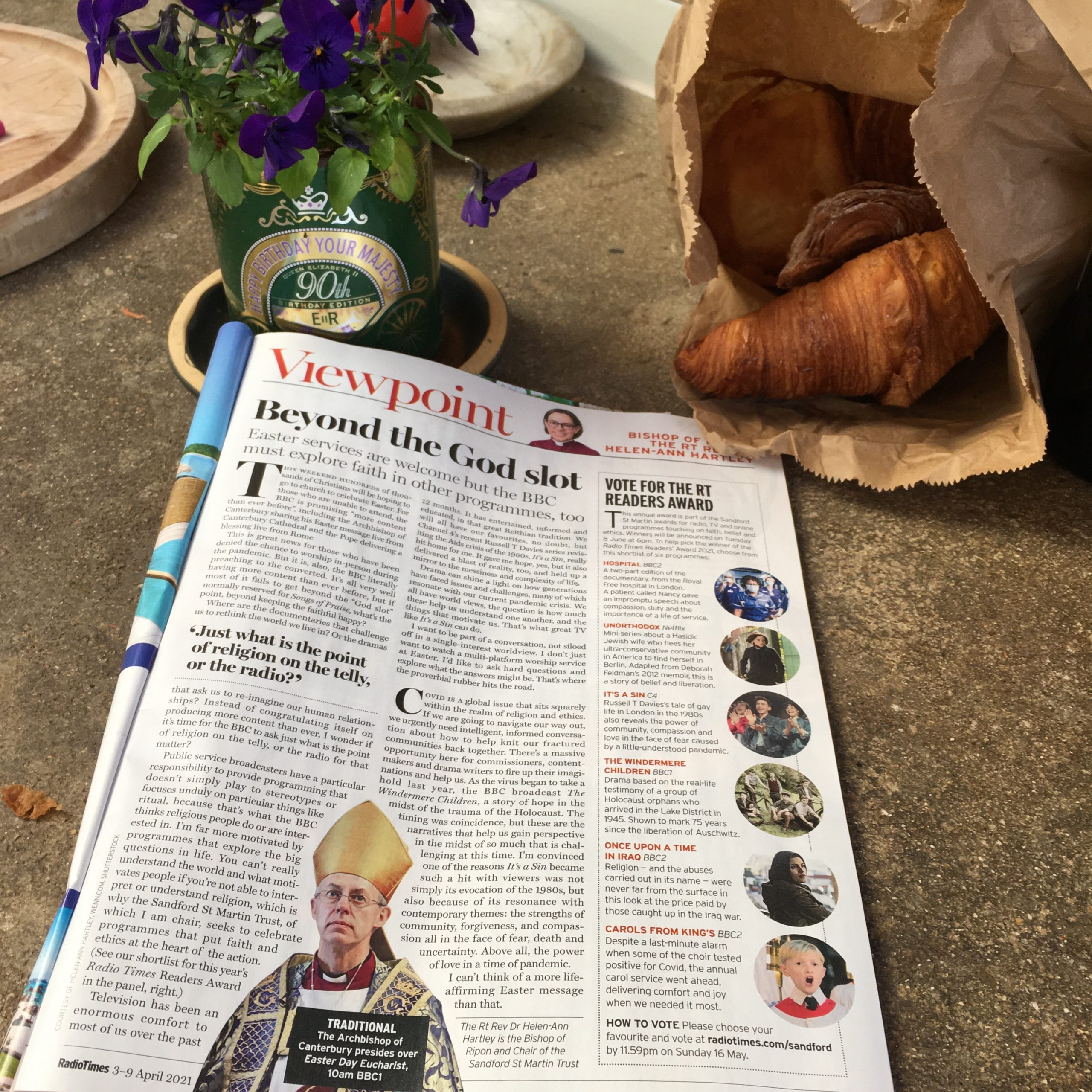Beyond the God Slot
Every Easter the Sandford St Martin Trust partners with the Radio Times magazine to identify what audiences feel has been the best programme touching on faith, belief or ethics over the last year. From the Trust’s perspective, the RT Readers’ competition is a unique opportunity to connect with audiences – there’s always something on the list that surprises us and the winners prove that, when you scratch the surface, some of the best and best-loved programmes on television are unafraid of dealing with The Big Questions. Grantchester, Call the Midwife, Good Omens and Jimmy McGovern’s Broken are among the dramas that have won this award. But documentaries have also featured with Sally Phillips’ moving documentary A World Without Down’s Syndrome? and A Vicar’s Life having taken the prize in recent years. This year’s list of contenders, published in the magazine, is just as compelling. And it was an opportunity for our Chair to share her thoughts about what makes for great broadcasting about religion in the magazine’s Point of View column. With the kind permission of the Radio Times it is reproduced below. If you want to vote for your favourite programme this year, you have until 11.59 pm on Sunday 16 May 2021 to do so. For more details click here. Or visit radiotimes.com/sandford.

Beyond the God Slot: Easter services are welcome but the BBC must explore faith in other programmes, too
By the Bishop of Ripon, The Rt Rev Dr Helen-Ann Hartley
Originally published in the Radio Times 3-9 April 2021
This weekend hundreds of thousands of Christians will be hoping to go to church to celebrate Easter. For those who are unable to attend, the BBC is promising “more content than ever before”, including the Archbishop of Canterbury sharing his Easter message live from Canterbury Cathedral and the Pope delivering a blessing live from Rome.
This is great news for those who have been denied the chance to worship in-person during the pandemic. But it is, also, the BBC literally preaching to the converted. It’s all very well having more content than ever before, but if most of it fails to get beyond the “God slot” normally reserved for Songs of Praise, what’s the point, beyond keeping the faithful happy?
Where are the documentaries that challenge us to rethink the world we live in? Or the dramas that ask us to re-imagine our human relationships? Instead of congratulating itself on producing more content than ever, I wonder if it’s time for the BBC to ask just what is the point of religion on the telly, or the radio for that matter?
Public service broadcasters have a particular responsibility to provide programming that doesn’t simply play to stereotypes or focuses unduly on particular things like ritual, because that’s what the BBC thinks religious people do or are interested in. I’m far more motivated by programmes that explore the big questions in life. You can’t really understand the world and what motivates people if you’re not able to interpret or understand religion, which is why the Sandford St Martin Trust, of which I am chair, seeks to celebrate programmes that put faith and ethics at the heart of the action.
Television has been an enormous comfort to most of us over the past 12 months. It has entertained, informed and educated, in that Reithian tradition. We will all have our favourites, no doubt, but Channel 4’s recent Russell T Davies series revisiting the Aids crisis of the 1980s, It’s A Sin, really hit home for me. It gave me hope, yes, but it also delivered a blast of reality, too, and held up a mirror to the messiness and complexity of life.
Drama can shine a light on how generations have faced issues and challenges, many of which resonate with our current pandemic crisis. We all have world views, the question is how much these help us understand one another, and the things that motivate us. That’s what great TV like It’s A Sin can do.
I want to be part of a conversation, not siloed off in a single-interest worldview. I don’t just want to watch a multi-platform worship service at Easter. I’d like to ask hard questions and explore what the answers might be. That’s where the proverbial rubber hits the road.
Covid is a global issue that sits squarely within the realm of religion and ethics. If we are going to navigate our way out, we urgently need intelligent, informed conversation about how to help knit our fractured communities back together. There’s a massive opportunity here for commissioners, content-makers and drama writers to fire up their imaginations and help us. As the virus began to take a hold last year, the BBC broadcast The Windermere Children, a story of hope in the midst of the trauma of the Holocaust. The timing was coincidence, but these are narratives that help us gain perspective in the midst of so much that is challenging at this time. I’m convinced one of the reasons It’s A Sin became such a hit with viewers was not simply its evocation of the 1980s, but also because of its resonance with contemporary themes: the strengths of community, forgiveness, and compassion all in the face of fear, death and uncertainty. Above all, the power of love in a time of pandemic.
I can’t think of a more life-affirming Easter message than that.




Leave a Reply
Want to join the discussion?Feel free to contribute!